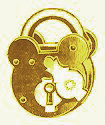 |
A Gazetteer of Lock and Key MakersJim Evansthis gazetteer is copyright Jim Evans, 2002 |
|
 |
A Gazetteer of Lock and Key MakersJim Evansthis gazetteer is copyright Jim Evans, 2002 |
|
C. E. MARSHALL, WOLVERHAMPTON Originally founded as a die casting company, who then developed into the manufacture of locks for the motor industry, which they were able to do because of their expertise in producing the intricate die-castings required for these locks. Taken over by the Chubb organisation and later amalgamated with L&F Willenhall Ltd, eventually all production was combined on the L&F, Church Street,Willenhall site, which took the C. E. Marshall name. Acquired by Williams Holdings in 1997 and took over part of the Woods Street works of Josiah Parkes. I n 2001 they employed 400 workers but in February made 45 redundant. (Walsall Chronicle 2/2/01)
ALBERT MARSTON AND CO LTD, WELLINGTON WORKS, NORTH STREET, WOLVERHAMPTON. Albert Marston and Co had their beginning as a brass foundry started by Albert Marston in the 1880s in Wellington Works, Cemetery Road, Willenhall. They expanded to make cabinet and brass padlocks and the foundry became restricted to meet "in house" needs. In trade directories of 1914 and 1921 they are listed as lockmakers. In 1921 Albert Marston retired and sold the business to Samuel Percy Bryan, who had been a director if H & T. Vaughan but had left when they were taken over by Yale and Towne Manufacturing Co. (q.v.). Other directors were Bertram Cope, who married a daughter of Mr Graham, the proprietor of the Express and Star newspaper, and Enoch Pinson. The company was re-established as a limited company. Production expanded to manufacture a wider range of locks and associated hardware including motor and ships locks.
Decline in trade during the recession lead to the closure of the Willenhall works and foundry in 1927 and business was concentrated more on the manufacture of door locks, including stock locks and lever cylinder night latches. Their Wellington five lever cylinder lock, introduced in 1928, was their answer to the cylinder pin tumbler lock that had becoming popular in the early part of the 1900s. They manufactured locks under the WELLINGTON, TRAFALGAR and WATERLOO trademarks. During the Second World War lock manufacture virtually ceased, being replaced by munitions manufacture. Lock-making recommenced in difficult conditions caused by the shortage of raw materials in 1946. In 1951, on the retirement of Percy Bryan, Harry (Bill) Williams purchased a controlling interest in the company. Bill had joined Albert Marston as a trainee in 1936 whilst studying for his Institute of Production Engineers membership and, after war service in the Army between 1939 and 1945, he returned as assistant works manager, eventually becoming Managing Director on the retirement of Percy Bryan. Billís efforts were concentrated on new and innovative designs, including door furniture and window fittings, which were introduced in 1956. Marketing efforts were directed in seeking specification by the major housing authorities, the London County Council becoming their biggest customer. As demand for the companyís products expanded and space became limited at North Street, a new factory was built, in 1961, at Neachells Lane, Willenhall, known as Wellington Works. This was gradually expanded to 60,000 sq. feet and included a pressure aluminium die casting foundry and anodising plant, employing over 300 people, principally making door furniture and window fittings. They later supplied special locks for fire exits and were the instigators, with RADAR, of the keys and locks for disabled toilets By 1969 profitable trading lead to an increased interest in acquiring the company from several public companies and eventually, in 1971, the shareholders accepted an offer from the Chubb group. Bill Williams became a director of the new Chubb Group of lock companies, until he retired in 1983. Graham Davies, previously the company secretary and then financial director, became chief executive. Also at this point the company became more closely associated with Josiah Parkes, who were also members of the Chubb group. The company still operated independently until 1992, when it was merged completely into Josiah Parkes, the Neachells Lane works were closed and all Marston production moved to the Josiah Parkes works in Portobello Willenhall. There they maintained the manufacture of many items of the Marston range. In 1998, after the merger of the Chubb Group with Yale, following their acquisition by Williams Holdings, production was rationalised in the Portobello works under the Yale Chubb Union brands, with only a few of the specialised Marston range of locks still being produced. (Information from Bill Williamsís 12/8/99-18/12/1999)
MARSTON AND GAUNT, 35 BLOXWICH ROAD, SOUTH WILLENHALL Iron padlock makers. In 1921 there was an Edwin Marston at 27b Bloxwich Road Willenhall. Existing in 1936 and 1953. Not existing in 1970. Nothing else known.
CHARLES EDWIN MARSTON, IDEAL WORKS, LITTLE CLOTHIER STREET, WILLENHALL
CHARLES MASON, 39 WOLVERHAMPTON ROAD, WEDNESFIELD There was a Charles Mason senior at Wolverhampton Road, Wednesfield in 1888. In about 1959 the firm was being run by Mrs Mason. They did not produce anything but had somehow obtained an order to supply Basta Ltd, of Tubbercurry, Co Sligo, Ireland (qv) with double hand rim lock keys. Mrs Mason had them made by Arthur Hough and Sons Ltd (qv). This arrangement lasted until about 1962 when Basta approached Arthur Hough and Sons and cut out Mrs Mason. After this the business closed. |